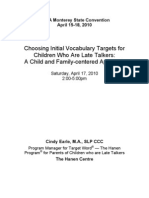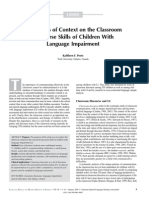Presentation SRCD Poster
Presentation SRCD Poster
Uploaded by
api-549339211Copyright:
Available Formats
Presentation SRCD Poster
Presentation SRCD Poster
Uploaded by
api-549339211Original Title
Copyright
Available Formats
Share this document
Did you find this document useful?
Is this content inappropriate?
Copyright:
Available Formats
Presentation SRCD Poster
Presentation SRCD Poster
Uploaded by
api-549339211Copyright:
Available Formats
Linking Parent-Child Conversations to Kindergarteners’ Autobiographical Memory Skills and Deliberate Strategy Use
Jennifer L. Coffman1, Dana M. Conlin1, Taylor T. Thomas2, Kesha N. Hudson2, Abigail R. Ward2, Alex Bailey2, Jennifer Shelton2, and Peter A. Ornstein2
University of North Carolina at Greensboro1 and University of North Carolina at Chapel Hill2
INTRODUCTION MEASURES RESULTS RESULTS
• Past research has indicated that the ways parents and children Mother-Child Reminiscing Task: MRM (Reese, Haden, & Fivush, 1993)
Parent Elaborations and Children’s Autobiographical Memory Parent reminiscing style was associated with children’s deliberate memory skills.
reminisce about past events and create shared narratives are • Each mother was asked to choose two novel, shared, one-time events
important for the development of autobiographical memory (Reese et to talk about with their child in whatever way felt natural for them. • Children’s autobiographical memory elaborations differed as a function of • Children’s sorting at the fall baseline trial did not differ as a function of their parents’ conversational style.
al., 2011). their parents’ style, such that children of high elaborative parents reported more
• These conversations were audio-recorded, transcribed and then
detailed recollections than children of parents low in elaboration (F(1, 49)=19.58, • However, children of highly-elaborative parents were more likely to take up instruction in strategic
• Autobiographical memory, or the ability to narrate details of previous coded using Reese, Haden, & Fivush (1993) structural/functional
p<.01). sorting after training than children of low-elaborative parents, as evidenced by higher ARC scores on the
experiences, is suspected to be associated with children’s deliberate coding system (See Table below for example).
generalization trial at Time 1 (F(43,6)=5.35, p=.02).
(or strategic) memory performance and strategy use (Ornstein, Children’s Elaborations
Haden, & San Souci, 2008). Code Definition
Elaborations Statements/questions that added new information
• Previous literature depicts these two as distinct skills and how these *
skills might co-develop and interlink has yet to be fully explored. Repetitions Statements/questions that repeated the same information
However, Ornstein, Haden, and Elischberger (2006) suggested
Confirmations / Confirming or negating something the other said
underlying processes of encoding, storing, retrieving information Negations
from memory, and reporting what was retrieved seem to be involved
in both. Associative Talk Describing past, future, or related events to ones discussed
• In recent literature, Langley, Coffman, and Ornstein (2017) found • Parents’ elaborative open-ended and close ended questions and
evidence that mothers’reminiscing style is associated with children’s statements were tallied and averaged across events to create an
deliberate memory skills, however, knowledge of this relationship is parental elaboration score. Children’s elaboration score was found
still limited. through the same process. Children’s Autobiographical Memory and Deliberate (Strategic) Memory
• Parents and children were classified as high or low elaborative based Time 1 Time 1 Time 2 Time 3
on a median split: • Parental Elaboration Median: 35 Children’s uptake of strategic instruction (deliberate memory) differed as a Baseline Generalization (Winter) (Spring)
SPECIFIC AIMS OF THE STUDY (Fall) (Fall)
• Children’s Elaboration Median: 22 function of their autobiographical memory performance.
In this exploration of the connections between parent-child reminiscing Free Recall with Organizational Training Task: FRT (Moely et al., 1992)
and the development of autobiographical and deliberate memory, we aim Children Low in
•At three time points (Fall, Winter, and Spring) children were asked to Memory Elaborations
to: DISCUSSION AND FUTURE DIRECTIONS
remember 16 line drawings (4 from 4 categories).
1.) Investigate children’s autobiographical memory as a foundational Children High in
• At Time 1, children completed a baseline trial (measuring Memory Elaborations
skill in the development of children’s deliberate memory; • Much remains to be understood about linkages between parent-child reminiscing, children’s autobiographical
spontaneous sorting), a training trial in which they were instructed in
memory, and children’s deliberate memory, especially with regard to the role that parent-child conversations might
2.) Examine parental reminiscing and elaborations on children’s categorical organization, and a generalization trial that served as an
indicator of their abilities to take advantage of this strategic play in the development of children’s strategic efforts. Moreover, little is known about the way in which home- and
later deliberate memory abilities.
instruction. classroom-level factors may contribute interactively to the development of young children’s strategic skills.
At Time 1, children who provided more memory elaborations in the MRM task
•Times 2 and 3 allowed for • In this study, kindergarten children’s autobiographical memory performance differed as a function of their
evidenced more strategic sorting after instruction in the FRT task than did
additional generalization trials. parents’ reminiscing style, as did students’ ability to take up training in an organizational strategy.
children who provided fewer memory elaborations. (F (1, 48)=5.52, p=.23)
METHODS
• Strategic sorting was indexed by • Children exposed to elaborative language at home may enter the classroom with more experience in retrieving and
the Adjusted Ratio of Clustering reporting information than their peers exposed to less elaborative language.
• Data for this study were drawn from an ongoing longitudinal
score, which ranges from -1 Linkages Between Parent-Child Conversations and
investigation of children’s memory and cognitive skills as they • Although it is certainly the case that parents’ language at home may differentially prepare children to take advantage
transition into elementary school. (below chance) to 0 (chance) to 1 Autobiographical and Deliberate Memory of instruction, the lack of sustained differences over the kindergarten year evidenced here suggest the need to
(perfect categorical sorting).
investigate aspects of the classroom that may interact with parental conversational style to facilitate children’s
• Child-, home- and school-level information were collected across the
strategic skills.
kindergarten year.
0.77** Children’s • The larger project from which these data are drawn will allow for the opportunity to expand our understanding of the
• Additional time points are underway, allowing for multi-level Parental Elaborations
DESCRIPTIVE STATISTICS Autobiographical Memory ways in which characteristics of the home environment, especially those related to the richness of language to
assessments through the beginning of the second grade. Elaborations which children are exposed (e.g., in conversations about past events) may contribute to and perhaps moderate the
impact of exposure to a classroom environment that is rich in teacher language on children’s cognitive outcomes.
Mean Min Max SD
PARTICIPANTS Parental Elaborations 39.56 7.50 119.0 22.59 Children’s 0.30* Children’s Uptake of
Autobiographical Strategic Memory
Children’s Elaboration 25.27 2.0 84.0 16.48 Memory Elaborations Instruction ACKNOWLEDGEMENTS
Participants were drawn from 3 Time 1 Baseline -0.21 -0.23 0.78 0.14
schools and included ARC Scores
51 kindergarteners: Children’s Uptake of
Time 1 Generalization -0.03 -0.23 1.00 0.43 0.32* We are grateful to the children, families, teachers , and research assistants who make this
Parental Elaborations Strategic Memory
ARC Scores work possible. The research reported here was supported by the Institute of Education
• 26 Males, 25 Females Instruction
Sciences, U.S. Department of Education, through Grant R305A170637 to the University of
Time 2 ARC Scores 0.06 -0.23 1.00 0.52
• Age Range: 4.93 to 6.43 years North Carolina at Greensboro. The opinions expressed are those of the authors and do not
Time 3 ARC Scores 0.06 -0.23 1.00 0.50 represent views of the Institute or the U.S. Department of Education.
*p<.05, **p<.01
You might also like
- The Young Child and Mathematics, Third EditionFrom EverandThe Young Child and Mathematics, Third EditionRating: 5 out of 5 stars5/5 (2)
- Brock2018 - The Development of Theory of MindDocument12 pagesBrock2018 - The Development of Theory of MindTSG100% (1)
- Burns 1987Document9 pagesBurns 1987Audris VondreaNo ratings yet
- Anecdotal RecordsDocument8 pagesAnecdotal RecordsAruba AshharNo ratings yet
- Yonovitz 1995 AaDocument9 pagesYonovitz 1995 AaLucky Ade SessianiNo ratings yet
- Hadley1993 PDFDocument11 pagesHadley1993 PDFLeisa GviasdeckiNo ratings yet
- Vocabulary Competence in Early Childhood: Measurement, Latent Construct, and Predictive ValidityDocument18 pagesVocabulary Competence in Early Childhood: Measurement, Latent Construct, and Predictive Validitycheryllee7777777No ratings yet
- Neville Et Al. Family-Based Training Program Improves Brain Function, Cognition, and Behavior inDocument6 pagesNeville Et Al. Family-Based Training Program Improves Brain Function, Cognition, and Behavior infreitas.pianoNo ratings yet
- Davidson Et Al. 2018 Effects Auditory Deprivation On WM and Reasoning Verbal and Visuospatial Cochlear ImplantsDocument12 pagesDavidson Et Al. 2018 Effects Auditory Deprivation On WM and Reasoning Verbal and Visuospatial Cochlear ImplantsAriana MondacaNo ratings yet
- Speed of Processing, Working Memory, and Language Impairment in ChildrenDocument22 pagesSpeed of Processing, Working Memory, and Language Impairment in ChildrenMacarena VargasNo ratings yet
- Example Lesson Plan 22 23Document4 pagesExample Lesson Plan 22 23api-672866550No ratings yet
- The Auditory Analysis Test: An Initial ReportDocument9 pagesThe Auditory Analysis Test: An Initial ReportShirley HaNo ratings yet
- M3 Answer KeyDocument10 pagesM3 Answer Keycheng jamieNo ratings yet
- The Role of Informal Reading Inventories in Assessing Word RecognitionDocument4 pagesThe Role of Informal Reading Inventories in Assessing Word RecognitionashrafNo ratings yet
- Larisa V. Shavinina (Auth.), Larisa V. Shavinina (Eds.) - International Handbook On Giftedness-Springer Netherlands (2009)Document31 pagesLarisa V. Shavinina (Auth.), Larisa V. Shavinina (Eds.) - International Handbook On Giftedness-Springer Netherlands (2009)nana jaemNo ratings yet
- SC 16, Choosing Initial Vocabulary Targets For Children Who Are Late Talkers, A Child and Family Centered Approach, EarleDocument9 pagesSC 16, Choosing Initial Vocabulary Targets For Children Who Are Late Talkers, A Child and Family Centered Approach, Earle黃柏樹No ratings yet
- Para TereDocument13 pagesPara TereTere TiixtixNo ratings yet
- MothereseDocument19 pagesMothereseGilberto MaldonadoNo ratings yet
- Special Me 1Document4 pagesSpecial Me 1api-478296665No ratings yet
- NIH Public Access: Young Children's Memory For The Times of Personal Past EventsDocument23 pagesNIH Public Access: Young Children's Memory For The Times of Personal Past EventsunisimonNo ratings yet
- Reading Principles and TeachingDocument10 pagesReading Principles and TeachingErvina SelviyanaNo ratings yet
- 3 Gough. Thinking About ThinkingDocument6 pages3 Gough. Thinking About ThinkingYEEMA A/P MOHGAN MoeNo ratings yet
- Clark 2012Document16 pagesClark 2012Stefania RodriguezNo ratings yet
- B-2020 SC Dynamic Assessment HandoutDocument6 pagesB-2020 SC Dynamic Assessment Handoutwosenyelesh adaneNo ratings yet
- CLASS B 5 Alignment and SummariesDocument3 pagesCLASS B 5 Alignment and SummariesashlajeuNo ratings yet
- Development of A Parent Report Measure For Profiling The Conversational Skills of Preschool ChildrenDocument9 pagesDevelopment of A Parent Report Measure For Profiling The Conversational Skills of Preschool ChildrenwaakemeupNo ratings yet
- Work Work VocabGuideDocument106 pagesWork Work VocabGuideIsnaPurnamaNo ratings yet
- Plac908 Dap Record 2023 Individual 3Document3 pagesPlac908 Dap Record 2023 Individual 3api-707012797No ratings yet
- Understanding Basic Relational Concepts in Directions - Mexican and US Children 2023Document17 pagesUnderstanding Basic Relational Concepts in Directions - Mexican and US Children 2023maria.acevedo3No ratings yet
- Finger Play Lesson PlanDocument4 pagesFinger Play Lesson Planapi-672866550No ratings yet
- Training - Parents - To - Use - The - Natural - Lang (2) - 1Document23 pagesTraining - Parents - To - Use - The - Natural - Lang (2) - 1reem.srour.23No ratings yet
- Iq AdolecenteDocument13 pagesIq AdolecenteEduardo RodriguezNo ratings yet
- 2.Jusczyk 2016-How Infants Adapt Speech-processing Capacities to Native-language StructureDocument5 pages2.Jusczyk 2016-How Infants Adapt Speech-processing Capacities to Native-language StructureRainn759No ratings yet
- Plac908 Dap Record 2023 Learning Story 2Document3 pagesPlac908 Dap Record 2023 Learning Story 2api-707012797No ratings yet
- Child Care & Early Education: Research ConnectionsDocument17 pagesChild Care & Early Education: Research ConnectionsMasniary HapsariNo ratings yet
- Focused Anecdotal Records Assessment: A Tool For Standards-Based, Authentic AssessmentDocument10 pagesFocused Anecdotal Records Assessment: A Tool For Standards-Based, Authentic AssessmentRisaNo ratings yet
- Book Reading Wiyh Young CildrenDocument16 pagesBook Reading Wiyh Young CildrenRizki MaulidinNo ratings yet
- TEST PROPOSAL FinalDocument5 pagesTEST PROPOSAL Finaljomelleann.pasolNo ratings yet
- Re Lesson Plan Pre-Primary/ PrimaryDocument6 pagesRe Lesson Plan Pre-Primary/ Primaryapi-397806940No ratings yet
- Linguistic Environment of Preschool Classrooms. What Dimensions Support Children's Language GrowthDocument14 pagesLinguistic Environment of Preschool Classrooms. What Dimensions Support Children's Language GrowthAdina Alexandra BaicuNo ratings yet
- 1 s2.0 S0885200621000910 MainDocument8 pages1 s2.0 S0885200621000910 MainDIEGO FRANCO ESPINOZANo ratings yet
- Poberty and BrainDocument13 pagesPoberty and BrainRaul Morales VillegasNo ratings yet
- Literature Presentation 041017Document17 pagesLiterature Presentation 041017api-367432250No ratings yet
- Kirkwoodetal.2001.ROCF DynasstDocument13 pagesKirkwoodetal.2001.ROCF DynasstAlicia HizonNo ratings yet
- Eric Ed351665Document14 pagesEric Ed351665كرة القدم عالميNo ratings yet
- Phase 3 - Carolina Torres RamírezDocument5 pagesPhase 3 - Carolina Torres RamírezCarolina TorresNo ratings yet
- Assessment PlanningDocument17 pagesAssessment PlanningMena HamadiNo ratings yet
- Conallen& Reed 2017 - Teaching Conversations Involving Feelings About EventsDocument14 pagesConallen& Reed 2017 - Teaching Conversations Involving Feelings About EventsemaswimzNo ratings yet
- The Effects of Single-Parent Households On The Literacy Achievement of Third-Grade African-American StudentsDocument19 pagesThe Effects of Single-Parent Households On The Literacy Achievement of Third-Grade African-American StudentscriselNo ratings yet
- Efficacy Trial of The Second Step Early Learning Sel Curriculum Preliminary OutcomesDocument11 pagesEfficacy Trial of The Second Step Early Learning Sel Curriculum Preliminary Outcomesapi-466063419No ratings yet
- Facilitating Prelinguistic Communication Skills in Young Children With Developmental Delay II: Systematic Replication and ExtensionDocument11 pagesFacilitating Prelinguistic Communication Skills in Young Children With Developmental Delay II: Systematic Replication and ExtensionAlexandra DragomirNo ratings yet
- Session 8 FS, Teaching Internship, Action Research BLEPT NotesDocument14 pagesSession 8 FS, Teaching Internship, Action Research BLEPT NotesGabriel JavierNo ratings yet
- The Unseen Side of ParentsDocument16 pagesThe Unseen Side of ParentsRushnol Jade Piluden-TupacNo ratings yet
- Blackwell, 2004Document5 pagesBlackwell, 2004Cássia DieguezNo ratings yet
- ED452998Document17 pagesED452998Sara CarvalhoNo ratings yet
- RPH Bi T6 2019Document98 pagesRPH Bi T6 2019Najibul RahmanNo ratings yet
- PreoralDocument4 pagesPreoralKenneth de GuzmánNo ratings yet
- Conducting A Needs Analysis: Dr. Nurulwahida HJ Azid at Aziz Senior Lecturer School of Education and Modern LanguagesDocument9 pagesConducting A Needs Analysis: Dr. Nurulwahida HJ Azid at Aziz Senior Lecturer School of Education and Modern LanguagesmalarNo ratings yet
- Group 2 - ELM and LADocument40 pagesGroup 2 - ELM and LAyellstt2672No ratings yet
- Supporting Students with Communication Disorders. A Collaborative Approach: A Resource for Speech-Language Pathologists, Parents and EducatorsFrom EverandSupporting Students with Communication Disorders. A Collaborative Approach: A Resource for Speech-Language Pathologists, Parents and EducatorsNo ratings yet
- The Tritone Paradox: An in Uence of Language On Music PerceptionDocument14 pagesThe Tritone Paradox: An in Uence of Language On Music PerceptionJuan LunaNo ratings yet
- Chomsky's Cognitive TheoryDocument7 pagesChomsky's Cognitive TheoryCamCatimpo100% (1)
- Tes 117Document2 pagesTes 117Gramy LatumetenNo ratings yet
- Emotional MessagingDocument24 pagesEmotional MessagingdsynyardNo ratings yet
- Cot ScienceDocument4 pagesCot SciencedixieNo ratings yet
- EGOCENTRICDocument3 pagesEGOCENTRICNina CervantesNo ratings yet
- Rosenthal, Kinds ConsciousnessDocument13 pagesRosenthal, Kinds ConsciousnessFernando Adolfo Navarro QuirizNo ratings yet
- Chapter 6.metacogntionDocument18 pagesChapter 6.metacogntionKusum SharmaNo ratings yet
- Week 7 - The Physical Self (1) (20241008074804)Document23 pagesWeek 7 - The Physical Self (1) (20241008074804)Avin Palacios AblañaNo ratings yet
- Board of Intermediate Education:HyderabadDocument5 pagesBoard of Intermediate Education:Hyderabadjaya vinayNo ratings yet
- Memory-Mind MapsDocument4 pagesMemory-Mind MapsThiti VanichNo ratings yet
- DemystifyingIntuition PsychInqDocument54 pagesDemystifyingIntuition PsychInqAKT B Josep Mikhael SilaenNo ratings yet
- Lesson 2 ListeningDocument16 pagesLesson 2 Listeningmuhammad HasnainNo ratings yet
- IdealismDocument13 pagesIdealismkajerome2004100% (1)
- Thinking ErrorsDocument2 pagesThinking ErrorsAnnaNo ratings yet
- EnglishForYou - 3 - TGDocument282 pagesEnglishForYou - 3 - TGVirginia Marisol Hernández Sernaqué100% (1)
- Study of Memory in Psychology: Dr. Magda Fahmy Professor of Psychiatry Suez Canal UniversityDocument137 pagesStudy of Memory in Psychology: Dr. Magda Fahmy Professor of Psychiatry Suez Canal UniversityMuhammad SufyanNo ratings yet
- Pengaruh Model Project Based Learning (PJBL) Dan Problem Based Learning (PBL) Terhadap Kemampuan Berpikir Kreatif SiswaDocument256 pagesPengaruh Model Project Based Learning (PJBL) Dan Problem Based Learning (PBL) Terhadap Kemampuan Berpikir Kreatif SiswasyifaNo ratings yet
- 1698-Individualist and Collectivist Cultures and Their Influence On How We Perceive Others and The SelfDocument5 pages1698-Individualist and Collectivist Cultures and Their Influence On How We Perceive Others and The SelfLaura MiskovaNo ratings yet
- Week 6 PDFDocument5 pagesWeek 6 PDFJude BautistaNo ratings yet
- SH 004: Practical Research: WEEK 2: August 23 - 27, 2021Document50 pagesSH 004: Practical Research: WEEK 2: August 23 - 27, 2021Francine Mae HuyaNo ratings yet
- Educational Attitudes of College Students As Related To Their Personality Orientation in Respect of Fixed and Growth Mindset ValencesDocument17 pagesEducational Attitudes of College Students As Related To Their Personality Orientation in Respect of Fixed and Growth Mindset ValencesFlorence BondayiNo ratings yet
- Dyscalculia (Math)Document14 pagesDyscalculia (Math)David Montiel RamirezNo ratings yet
- Physiological Psychology Lecture 3 MidtermDocument2 pagesPhysiological Psychology Lecture 3 MidtermAngelo SumaoyNo ratings yet
- Episode 2: Learner Diversity: Developmental Characteristics, Needs and InterestsDocument8 pagesEpisode 2: Learner Diversity: Developmental Characteristics, Needs and InterestsVargas KimayNo ratings yet
- The Montessori Sensorial MaterialsDocument7 pagesThe Montessori Sensorial MaterialsJoy MasiragNo ratings yet
- CH 11Document10 pagesCH 11AyeshaNo ratings yet
- Thematic Analysis EvansonDocument30 pagesThematic Analysis Evansonapi-563773782No ratings yet
- Study Skill (Edit 3.0)Document81 pagesStudy Skill (Edit 3.0)Ryan UkasyahNo ratings yet
- Aristotle On Memory - Sorabji, Richard - 1972 - Brown University Press - 9780870571374 - Anna's ArchiveDocument142 pagesAristotle On Memory - Sorabji, Richard - 1972 - Brown University Press - 9780870571374 - Anna's Archivesara.betisNo ratings yet

























































































